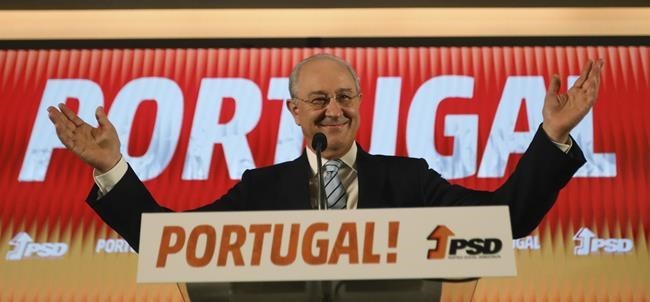LISBON, Portugal (AP) — Portugal’s center-left Socialist Party won a third straight general election Sunday, official results showed, returning it to power as the country prepares to deploy billions of euros (dollars) of European Union aid for the economy after the COVID-19 pandemic.
In a ballot that took place amid a surge of coronavirus cases blamed on the omicron variant, and with around 1 million infected voters allowed to leave home to cast their ballot, the Socialists elected at least 108 lawmakers in the 230-seat parliament.
With 98.7% of votes counted, the Socialists had 41%, compared with 28% for its main rival, the center-right Social Democratic Party, which took at least 66 parliamentary seats. Thirty-one seats remained to be allocated.
It was unclear whether the Socialists would reach 116 lawmakers, allowing it to enact legislation alone, or whether it would fall short of that number and need to cut deals for the support of smaller parties.
The stakes are high for the next administration. Portugal, a country of 10.3 million people and the poorest in Western Europe, is poised to begin deploying 45 billion euros ($50 billion) of aid as a member of the EU to help spur the economy after the pandemic.
Two-thirds of that sum is intended for public projects, such as major infrastructure, giving the next government a financial bonanza. The other third is to be awarded to private companies.
A parliamentary majority would smooth the next government’s path in allocating those funds in a country whose economy has struggled to gain traction since the turn of the century.
The past two Socialist administrations were minority governments. Since coming to power in 2015, the Socialist Party relied on the support of their smaller allies in parliament — the Left Bloc and the Portuguese Communist Party — to ensure the annual state budget had enough votes to pass.
But two months ago their differences, especially over public health spending and workers’ rights, were insurmountable, leaving Socialist Prime Minister António Costa short of votes in parliament to pass his party’s plan and triggering a snap election.
Costa, who is expected to remain as Socialist leader and prime minister, could need to repeat his political savvy to forge another alliance in a fragmented parliament.
Some 10.8 million voters — 1.5 million of them living abroad — were eligible to choose lawmakers in the Republican Assembly, Portugal’s parliament, where political parties then decide who forms a government.
Chega! (Enough!), a populist and nationalist party founded less than three years ago, collected around 7% of the vote. That might give it a dozen lawmakers, up from only one in the last parliament.
The Left Bloc captured some 4% of the vote, with about the same going to the Portuguese Communist Party. Other smaller parties could get one or more parliamentary seats and offer Costa their support.
Portugal’s economy needs a shot in the arm, which the EU funds may provide.
The country has been falling behind the rest of the 27-nation EU since 2000, when its real annual gross domestic product per capita was 16,230 euros ($18,300) compared with an EU average of 22,460 ($25,330). By 2020, Portugal had edged higher to 17,070 euros ($19,250) while the bloc’s average surged to 26,380 euros ($29,750).
The Socialists promised to increase the minimum monthly wage, earned by more than 800,000 people, to 900 euros ($1,020) by 2026. It is currently 705 euros ($800). The Socialists also want to “start a national conversation” about working four days a week instead of five.
Barry Hatton, The Associated Press



